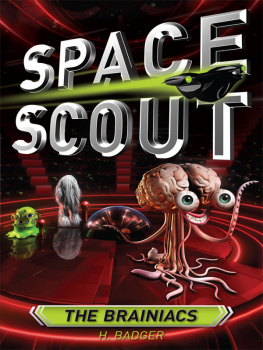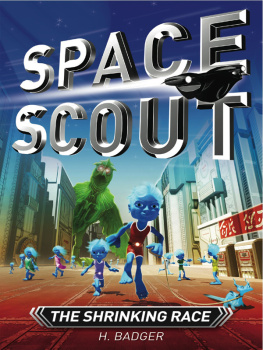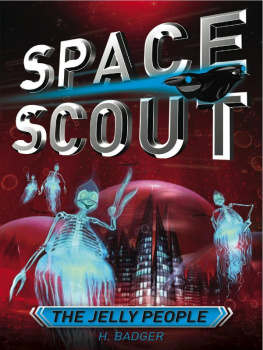Anthony J. Badger - Albert Gore, Sr.
Here you can read online Anthony J. Badger - Albert Gore, Sr. full text of the book (entire story) in english for free. Download pdf and epub, get meaning, cover and reviews about this ebook. year: 2019, publisher: University of Pennsylvania Press, Inc., genre: Politics. Description of the work, (preface) as well as reviews are available. Best literature library LitArk.com created for fans of good reading and offers a wide selection of genres:
Romance novel
Science fiction
Adventure
Detective
Science
History
Home and family
Prose
Art
Politics
Computer
Non-fiction
Religion
Business
Children
Humor
Choose a favorite category and find really read worthwhile books. Enjoy immersion in the world of imagination, feel the emotions of the characters or learn something new for yourself, make an fascinating discovery.

- Book:Albert Gore, Sr.
- Author:
- Publisher:University of Pennsylvania Press, Inc.
- Genre:
- Year:2019
- Rating:4 / 5
- Favourites:Add to favourites
- Your mark:
- 80
- 1
- 2
- 3
- 4
- 5
Albert Gore, Sr.: summary, description and annotation
We offer to read an annotation, description, summary or preface (depends on what the author of the book "Albert Gore, Sr." wrote himself). If you haven't found the necessary information about the book — write in the comments, we will try to find it.
Albert Gore, Sr. — read online for free the complete book (whole text) full work
Below is the text of the book, divided by pages. System saving the place of the last page read, allows you to conveniently read the book "Albert Gore, Sr." online for free, without having to search again every time where you left off. Put a bookmark, and you can go to the page where you finished reading at any time.
Font size:
Interval:
Bookmark:
Albert Gore, Sr.
POLITICS AND CULTURE IN MODERN AMERICA
Series Editors: Margot Canaday, Glenda Gilmore,
Michael Kazin, Stephen Pitti, and Thomas J. Sugrue
Volumes in the series narrate and analyze political and social change in the broadest dimensions from 1865 to the present, including ideas about the ways people have sought and wielded power in the public sphere and the language and institutions of politics at all levelslocal, national, and transnational. The series is motivated by a desire to reverse the fragmentation of modern U.S. history and to encourage synthetic perspectives on social movements and the state, on gender, race, and labor, and on intellectual history and popular culture.
A POLITICAL LIFE
Anthony J. Badger

Publication of this volume was aided by a grant from the Albert Gore Research Center.
Copyright 2019 University of Pennsylvania Press
All rights reserved. Except for brief quotations used for purposes of review or scholarly citation, none of this book may be reproduced in any form by any means without written permission from the publisher.
Published by
University of Pennsylvania Press
Philadelphia, Pennsylvania 19104-4112
www.upenn.edu/pennpress
Printed in the United States of America on acid-free paper
10 9 8 7 6 5 4 3 2 1
Library of Congress Cataloging-in-Publication Data
Names: Badger, Anthony J., author.
Title: Albert Gore, Sr. : a political life / Anthony J. Badger.
Other titles: Politics and culture in modern America.
Description: 1st edition. | Philadelphia : University of Pennsylvania Press, [2019] | Series: Politics and culture in modern America | Includes bibliographical references and index.
Identifiers: LCCN 2018022859 | ISBN 978-0-8122-5072-5 (hardcover)
Subjects: LCSH: Gore, Albert, 19071998. | United States. Congress. SenateBiography. | LegislatorsUnited StatesBiography. | Southern StatesPolitics and government18651950. | Southern StatesPolitics and government1951 | United StatesPolitics and government19331945. | United StatesPolitics and government19451989.
Classification: LCC E748.G689 B33 2019 | DDC 328.73092 [B]dc23
LC record available at https://lccn.loc.gov/2018022859
Illustrations follow
Albert Gore, Sr.
A WARM SUMMERS EVENING on the lawn of Ted Kennedys house in McLean, Virginia, in early August 1970: The guests were a microcosm of the national Democratic Partys liberal wing. Clark Clifford and Averell Harriman from the foreign policy establishment attended. Officials from the Machinists, the Auto Workers, the Electrical Workers, and the Teamsters represented labor. The chairman of the Senate Foreign Relations Committee, J. William Fulbright, joined Majority Leader Mike Mansfield and other senators. They were there to raise money for Albert Gores reelection campaign. Senator Daniel Inouye from Hawaii explained that Gore was the only senator to receive such a reception because this election is of historical importance. Inouye added, We are responding to the President [Nixon]. We are picking up his gauntlet. Ted Kennedy praised Gores courage for casting votes in the Senate that were unpopular in Tennessee, adding, His constituency is all of this great nation. The guests also presented Gore with a mementoa tree stump. He climbed up and gave a characteristically powerful stump speech.
The funds raised in McLean that evening went to hire Charles Guggenheim, the Kennedys favorite filmmaker, to produce six television advertisements for Gores campaign against his Republican opponent, William Brock. Guggenheims cinema vrit technique produced beautifully crafted ads stressing that Gore represented the values of his home, Smith County, in the hill country of Tennessee. The adverts captured Gore playing checkers with an elderly voter, talking to his uniformed son, Al, about the values of patriotism, and riding on a white horse in the Tennessee countryside.
Expensive TV ads were a far cry from Albert Gores first race for Congress in 1938. Then the state commissioner of labor, and former county superintendent of schools for Smith County, he had been the youngest of six candidates in the Democratic primary for Tennessees Fourth Congressional District. The six were vying for the seat made vacant by the incumbents decision to run for the governorship. Gore needed name recognition to compete with his better-known and older opponents. So he would liven up his stump speech by playing his fiddle, accompanied by musician friends who traveled round the large Fourth District with him. Gores fiddle-playing at the six or seven campaign stops he made each day distinguished him from the other candidates when there were, in practice, few significant policy issues to separate them.
The fiddle remained useful. While he was a congressman, Gores weekly radio show, broadcast every Sunday morning, was legendary in middle Tennessee. If a guest did not turn up or Gore was short of material, he would sometimes take up the fiddle again. But Gore was also alert to the possibilities of another medium. In 1951 Gore played on television in Nashville on Amateur Hour. My eyes have been opened about television, he reported. People whom I had never seen before would call me by name, mentioning having seen the television program. It is the coming of the future. He would use television in his 1952 campaign to unseat veteran senator Kenneth McKellar. Gore rarely had the funds for expensive TV advertisements in his subsequent campaigns, but he always had a sharp eye for the possibility of free coverage on local TV news programs. In 1969 and 1970, as he prepared to defend his Senate seat for the third time, he organized his week so that he would be in Nashville on Friday afternoons to catch the newscasts that night; in Knoxville and Chattanooga on Saturdays to catch the newscasts that day there; and in Memphis on Sundays to achieve the same effect.
But it was more than changes in modern campaigning techniques that characterized Gores political career. The young politician went to Congress when the four pillars of conservative control of the South identified by political scientist V. O. Key, Jr., were very much in placethe one-party system, African American disfranchisement, segregation, and malapportionment of state legislatures. Remove these, Key argued, and the forces of liberalism would be immeasurably strengthened.
During Gores thirty-two years in Washington, these pillars were comprehensively dismantled. African Americans were already voting in significant numbers by the 1950s. Even before the 1965 Voting Rights Act, those voters were providing the margin of victory for Democratic candidates in Tennessee The physical edifice of segregation crumbled under the combined weight of a civil rights movement, often led by Nashville students, and the federal government, through the Civil Rights Act of 1964. Rural overrepresentation in state legislatures was eliminated by the 1962 U.S. Supreme Court in light
This biography seeks to explain the underlying rhythms of Gores political career. That career is emblematic of several important themes in postwar U.S. politics and society. First and foremost it was the product of a modernizing South. Gore exemplified the new generation of Southerners that Franklin Roosevelt believed would take over from the conservatives in the economically changing South. Like other young Southerners, especially after World War II, Gore believed that the federal government was the solution and not the problem. New Deal-style measures could transform the position of the South as the nations number one problem. Social welfare measures, union organization, and farm programs could raise the purchasing power of ordinary Southerners and tackle the regions problem of chronic underconsumption. Above all investment in the regions infrastructure could modernize the South and produce a mechanized, diversified agriculture and a consumer-oriented, high-wage industry. The federal government could sponsor water-resource development, provide cheap electrical power, and make cheap credit available to a region that had previously been starved of investment. Indeed, the Tennessee Valley Authority provided the model of how the region could be transformed, and Albert Gore was a quintessential TVA liberal, as Alabama Senator John Sparkman described like-minded politicians. Gore was a passionate defender of the TVA, an enthusiastic advocate of nuclear power, and the legislative driving force behind the Interstate Highway Act of 1956. The consequences in the modern South are there for all to see.
Next pageFont size:
Interval:
Bookmark:
Similar books «Albert Gore, Sr.»
Look at similar books to Albert Gore, Sr.. We have selected literature similar in name and meaning in the hope of providing readers with more options to find new, interesting, not yet read works.
Discussion, reviews of the book Albert Gore, Sr. and just readers' own opinions. Leave your comments, write what you think about the work, its meaning or the main characters. Specify what exactly you liked and what you didn't like, and why you think so.











